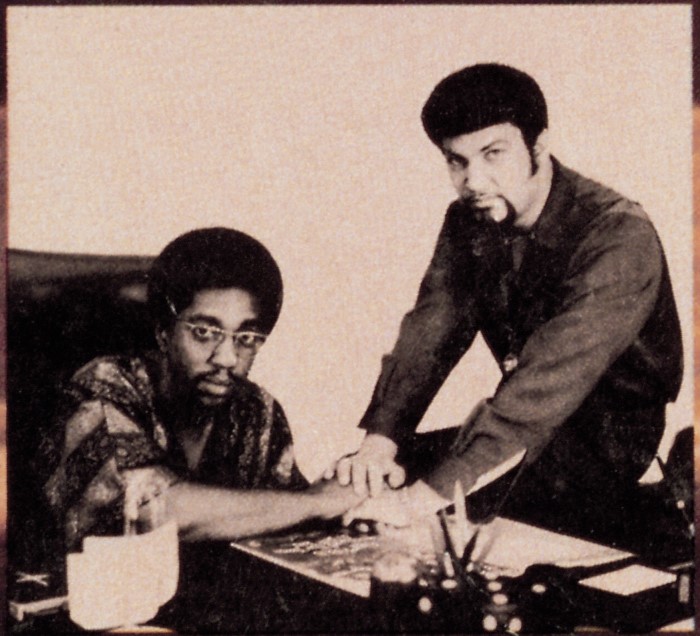WHITFIELD + STRONG

A Grammy-grabbing creative team, at work in Hitsville U.S.A.
- During the last few days of November 1966, when this image of Norman Whitfield (at right) and Barrett Strong was taken, Motown Records was on a roll. It had no fewer than nine titles on the Billboard Hot 100, including the Supremes’ “You Keep Me Hangin’ On” at Number One, and a tenth release “bubbling under.” These were exciting times, in particular, for the company’s top-notch songwriting/production team, Holland/Dozier/Holland, who were responsible for six of those ten titles. But Barrett and Norman each had their own reasons to be cheerful, and were doubtless cooking up more hits in their office when the photographer came to call.
- The Temptations’ “(I Know) I’m Losing You” was the fastest-rising Motown single that November chart week, with Whitfield as its co-writer and producer. What’s more, this was his third consecutive smash with the group, following “Ain’t Too Proud To Beg” and “Beauty Is Only Skin Deep,” for which he held the same creative credits. Barrett, meanwhile, could take pleasure from another fast riser, Jr. Walker & the All Stars’ “Money (That’s What I Want).” This was a remake of the song which Strong himself had taken onto the charts six years earlier, making it the first major hit recorded at Motown’s then-new home at 2648 West Grand Boulevard in Detroit.
- Fast-forward two years to late November 1968, and Whitfield/Strong were just about the hottest names at Hitsville. Marvin Gaye’s version of their song, “I Heard It Through The Grapevine” (which Whitfield also produced), was burning up the charts, soon to become Motown’s biggest-selling single of the ’60s. Also rising rapidly that week was “Cloud Nine” by the Temptations – which not only introduced the world to the vocal talents of Dennis Edwards, but also marked the start of Whitfield/Strong’s “psychedelic soul” success. Shortly after this photo was taken, the pair began work on the Tempts’ Cloud Nine album, which included another psych-soul masterpiece, “Run Away Child, Running Wild.”
- Many more Whitfield/Strong hits were to follow, including the Temptations’ “Ball Of Confusion (That’s What The World Is Today)” and “Papa Was A Rollin’ Stone,” Edwin Starr’s “War” and the Undisputed Truth’s “Smiling Faces Sometimes.” The pair had no set way of working. “I was into the style of music he liked, and he was into the style of music I liked,” Strong recalled in 1991 for The Billboard Book of Number One Rhythm & Blues Hits. “The whole period of time we worked together, it was real smooth.”
- After Motown quit Detroit for Los Angeles in 1972, Strong left the company, returning to singing via a contract with Epic Records. Subsequently, he switched to Capitol Records, where one of his two albums there included a remake of “Money (That’s What I Want).” Whitfield also bid adieu to Motown in 1973, setting up his own Whitfield Records in California, writing and producing hits for, among others, Rose Royce. These included a Number One for the group in 1977 with the title song of the movie Car Wash; Whitfield’s score for the film also earned a Grammy. This was just one such triumph: his and Barrett’s work with the Temptations on “Cloud Nine” earned the group their – and Motown’s – first-ever Grammy. The two men grabbed another of those statuettes in 1972 for “Papa Was A Rollin’ Stone,” honored as the year’s Best R&B Song. The solidarity suggested in the photo above was real.




